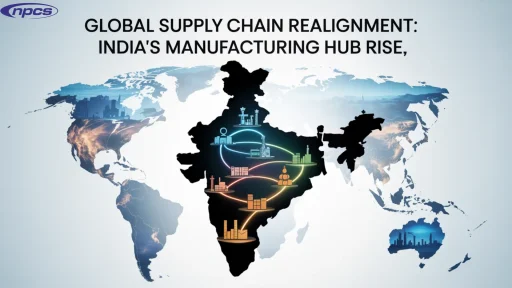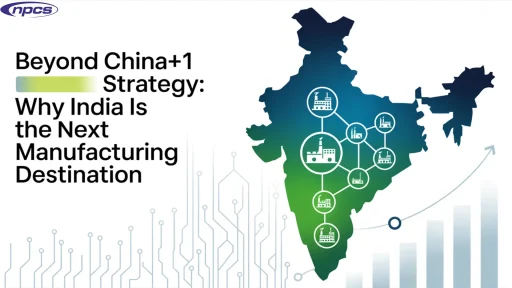Driven by large export potential and a burgeoning start-up movement in food processing innovations, India’s food processing industry is evolving to become a global game changer. With strong agricultural traditions supported by policy frameworks, this sector is emerging as a sunrise industry that envisions inclusive growth, rural empowerment, and global market leadership.
A Sunrise Sector with Immense Export Potential
India is the world’s largest producer of food staples including fruits, vegetables, cereals, milk, and livestock. This agricultural bounty feeds into the fast-growing Indian food processing industry. With respect to innovation and value addition, this has been growing in leaps and bounds.
In FY 23, India produced 212 million metric tons of vegetables and 112 million metric tons of fruits, which is becoming a huge opportunity for export potential and serves as the launchpad for a new generation of food processing startups that innovate across the value chain.
The industry is expected to be valued at $535 billion by 2025-26 and is on track to cross $700 billion by 2030, presenting huge opportunities for growth within India and abroad.
Export Potential: India’s Global Food Gateway
Exports from India’s food processing sector over the last ten years have shown exponential growth. Processed food exports grew by 150% or more between 2014 and 2023, whereas totalagricultural exports reached $53 billion in 2022-23.
The unit share of processed foods in total agri-food exports has increased from 14.9% in 2017-18 to 23.4% in 2022-23, thus marking a strategic shift toward value-added food exports wherein the export potential lies not just in raw produce but in globally competitive processed goods.
Key Export Markets and Products
Major Indian export markets include:
- Saudi Arabia
- Iran
- Iraq
- UAE
- Benin
- Vietnam
- USA
- Singapore
- Bangladesh
Of all the export-enhancing products, cereal products stand out. India is the world’s number one exporter of rice, covering a wide range of both Basmati and Non-Basmati varieties, with over 95% of total cereal exports attributed towards it.
Some of the other important subjects for exports are:
- Processed fruits and vegetables
- Dairy and meat products
- Marine and aquaculture items
- Readymade packaged goods
This diverse range will further contribute to the export potential of India and will bring it more international buyers by way of quality, quantity, and reliability.
Value Addition & Infrastructure: Enhancing Export Potential
The Ministry of Food Processing Industries (MoFPI) has already initiated proactive measures towards better export potential from infrastructure improvements and policy incentives:
- 41 Mega Food Parks offering plug-and-play facilities
- 76 Agro-Processing Clusters for local entrepreneurs
- 400+ Cold Chain Projects ensuring Export Freshness
- 209 Quality Assurance Facilities meeting global standards
The set of infrastructural developments reduces post-harvest losses while extending the shelf-life, directly impacting India’s export potential and enabling food processing startups to confidently scale operations.
Food Processing Startups: Driving Innovation and Growth
Perhaps most transformational for this industry is the trend in food processing startups. Such startups are breaking the conventional way of doing things by innovating across the broadest solutions in logistics, traceability, packaging, and health-oriented product segments.
Food processing startups in India are best positioned to answer some of the sector’s toughest challenges.
- Food wastage and inefficient logistics
- No direct farmer-market linkages
- Quality inconsistencies and regulatory hurdles
Food processing startups contribute significantly towards India’s export potential, realizing new efficiency.
Why Food Processing Startups Are Thriving
1. Supportive Policies
Some schemes like the Production Linked Incentive (PLI), Make in India, and Startup India are propelling growth in food processing startups. These policies provide support from grants and tax incentives to easy access to land and utilities.
2. Robust Funding Ecosystem
April 2000 to December 2023, India has attracted $12.5 billion in FDI equity inflows into the food processing sector. In addition, venture capitalists and private equity investors are also actively funding food processing startups with high scalability and export focus.
3. Tech Integration
The modern food processing startups are based on:
- Artificial Intelligence (AI)
- Blockchain for traceability
- Internet of Things (IoT) for real-time logistics
- Automation for scalable production
These technologies allow the startups to meet the global food standards, thus directly contributing to the export potential of India.
High-Growth Segments for Food Processing Startups
1. Ready-to-Eat & Packaged Foods
With this increasing urbanization, there is increasing demand for healthy alternatives with Quick-cook and this opens up a whole new opportunity for food processing startups to innovate on the regional flavors, nutrition-rich ingredients, and sustainable packaging.
2. Cold Chain Logistics
Poor cold storage contributes to India losing 20-30% of its produce after harvest. Food processing startups with a focus on cold-chain technology will be able to cut losses dramatically while boosting export potential by enhancing the integrity of the products.
3. Functional and Nutraceutical Foods
Startups looking at wellness, plant-based proteins, and dietary supplements are really hot at the moment-you can find them in every corner of the globe. These confluences of health and food provide a very large potential for export.
Employment Generation & Rural Prosperity
Over 12% of India’s organized manufacturing workforce is absorbed by the food processing sector. The growth of food processing startups creates new employment avenues in:
- Safety and quality assurance of food.
- Supply chain and logistics.
- Product development & branding.
The model not only reduces migration by setting up units in semi-urban and rural areas, but also goes a great way to generate income for farmers and local laborers. This inclusive model strengthens rural economies while boosting export potential.
Policy Support: Paving the Path for Global Leadership
The government of India has brought in various schemes to maximize potential in terms of exports in its food processing sector:
- PLI Scheme: 76,900 crores in investments; 1,070 crores disbursed in incentives
- Cold Chain Expansion: 35 million metric tons of added capacity
- Food Safety Framework: 209 globally compliant facilities started
- Digital Portals & Export Hubs: Ease of doing business for food processing startups
These frameworks are inevitable for converting India into a food processing export superpower.
Challenges That Need Addressing
As strong as the export potential for the sector is, still sore points include:
- Lack of cold chain infrastructure in Tier-II & Tier-III cities
- Limited awareness about food certification standards among SMEs
- Inconsistent power supply, affecting processing units
- Challenges in the accessibility of credit for nascent food processing startups
Investing in R&D for product innovation would move into:
- Skills development and capacity building programs
- Digitizing and traceability from farm to fork
- Collaborations between startups, research institutions and FPOs
A Trillion-Dollar Vision for 2035
India’s food processing industry is set to touch $1.1 trillion by 2035. The export potential, however, extends beyond food products alone; food processing machinery exports reached $3.1 billion in 2023, with the US, UAE, Singapore, and Saudi Arabia as the prime markets.
The growth is being powered by the entrepreneurial zeal of food processing startups, emerging rapidly as the backbone of India’s new food economy.
Conclusion: India’s Moment to Lead the World
The food processing industry in India is experiencing a very pivotal stage in history. It is on the verge of making its presence felt on the global platform with unlimited export potential, a thriving ecosystem of food processing startups, and government support.
This is the right opportunity to ride the momentum for investors, entrepreneurs, and policymakers. The world is hungry-not just for food but also for innovations, sustainability, and quality-and India is in a unique position to respond.
Food processing startups are the engine for this revolution, and the innovations shall not only strengthen India’s export potential but shall uplift millions across the agricultural value chain.
Some More Links
Join With Us
Related Blogs
https://www.niir.org/blog/starting-a-silicon-crystals-business/
https://www.niir.org/blog/the-most-profitable-chemical-industry-business-in-the-philippines/#
Join us on YouTube
https://www.youtube.com/c/NIIRproject/playlists






